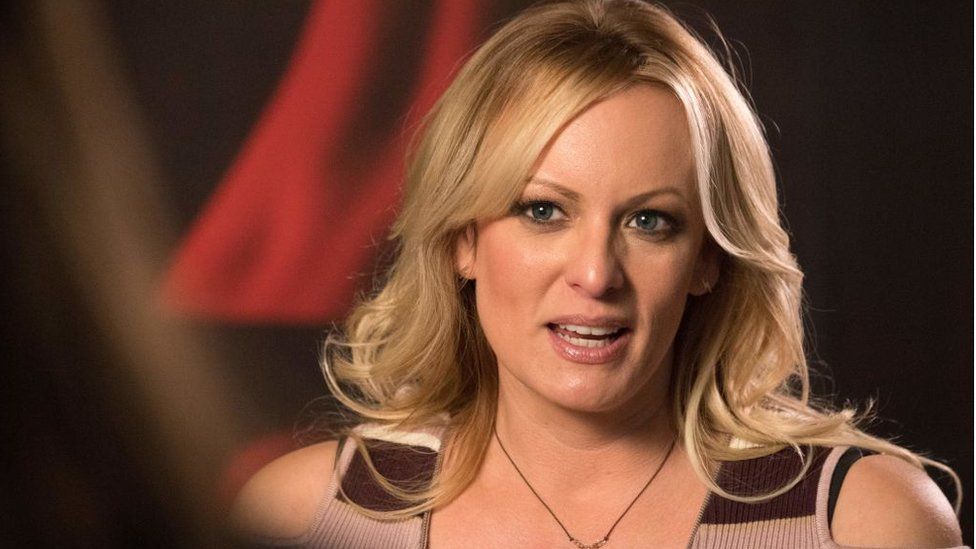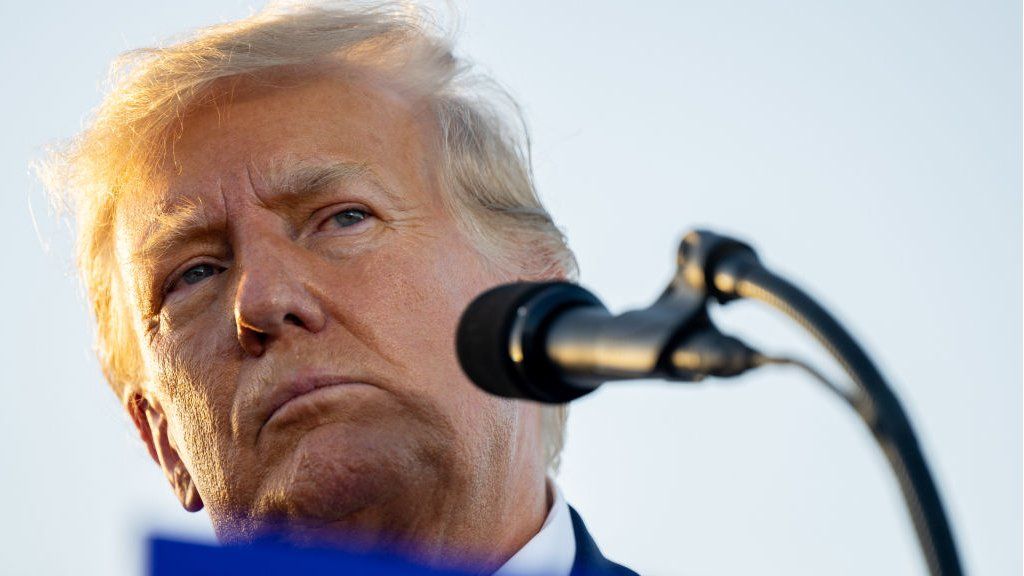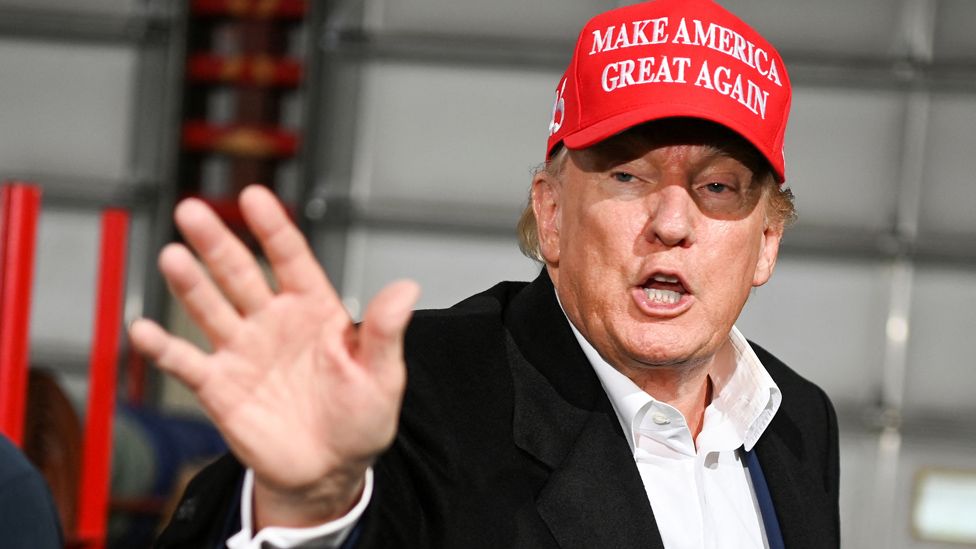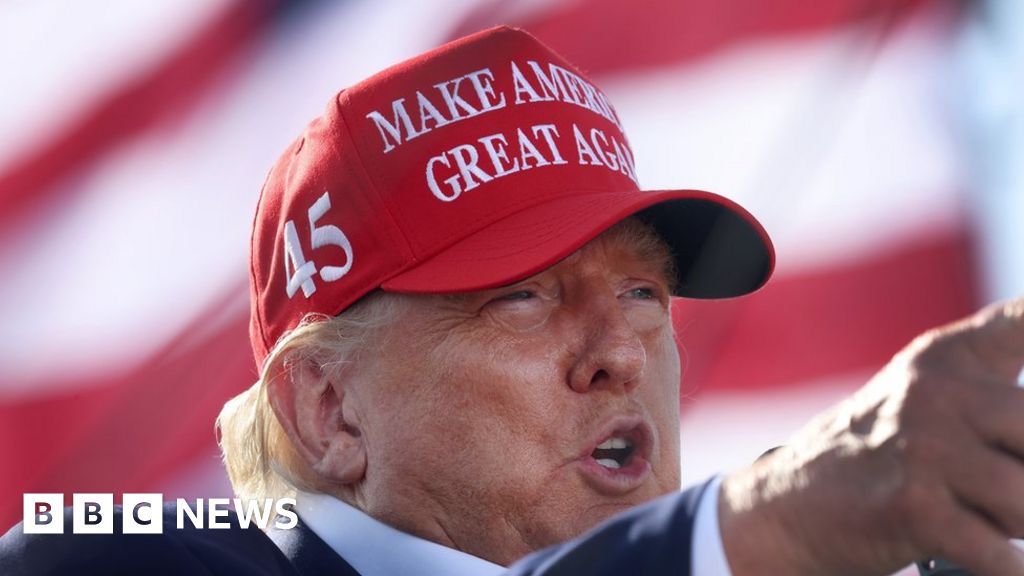This video can not be played
To play this video you need to enable JavaScript in your browser.
Former US President Donald Trump is due to appear in a New York City courthouse on Tuesday.
This will be the moment when the criminal charges against him – the first against a US president – will be made public.
Mr Trump denies any wrongdoing.
Here’s what to look out for:
1. What are the actual charges against Trump?
Manhattan District Attorney Alvin Bragg has been investigating a $130,000 (£105,000) payment made by Mr Trump’s former lawyer Michael Cohen to porn star Stormy Daniels, which was made to keep her quiet about an alleged affair.
This is not illegal, and Mr Trump has acknowledged reimbursing Mr Cohen for the payment.
However, when he reimbursed Mr Cohen, the record for the payment says it was for legal fees.
Prosecutors say this amounts to Mr Trump falsifying business records, which is a misdemeanour – a criminal offence – in New York, and we expect the charges to be related to that.
Mr Trump’s lawyer Joe Tacopina said last week that he believed the case against Mr Trump could include 30 separate charges – possibly because each cheque that Mr Trump wrote to Mr Cohen would be counted separately.
2. Will one of the charges against Trump be a felony?
In New York, fraud can be a felony if the lie was made with the intent to conceal or commit another crime. Sources close to the case have told US media that they believe at least one of the charges against Mr Trump could be a felony.
What could that be? Most signs point to breaking campaign finance rules – Mr Cohen has already been convicted for breaking campaign finance rules and tax evasion in connection to the payment.

This would mean prosecutors believe that Mr Trump tried to hide his payments to Ms Daniels because he didn’t want voters to know they had an affair – the payments were allegedly made in the weeks before the 2016 election, and so it is possible they could be considered a part of his campaign.
Most felony fraud cases carry a maximum of about five years in prison, although it is common for convicts to be sentenced to just probation, or a fine.
Even if convicted, it is highly unlikely that the former president could be legally prevented from running in a future presidential election, and Mr Trump has made clear he will not abandon his 2024 White House campaign.
3. Could there be an additional charge relating to another case?
Prosecutors have asked at least one witness questions about a $150,000 payment made to Karen McDougal, a former Playboy magazine Playmate of the Year. Ms McDougal has claimed she had a relationship with Mr Trump in 2006.
The money was paid by the National Enquirer, a tabloid magazine, in what media have reported was an attempt to keep her story from being published by any other outlet.
It’s not clear if she was questioned to bring separate charges, or to establish a pattern of behaviour by Mr Trump relating to the Stormy Daniels case.
4. How strong is the case against Mr Trump?
The indictment is expected to set out what prosecutors believe Mr Trump has done, with some information as to how and when, and from that we will get a sense of the case they have built against him.
The Manhattan District Attorney’s office routinely prosecutes people for falsifying business records, but convicting a felony charge could be more challenging, said Norm Eisen, an expert on law, ethics and anti-corruption at the Brookings Institution.
Manhattan DA Alvin Bragg would have to prove that Mr Trump knew he was breaking the law and that he falsified business records with the aim of helping his presidential campaign.
Mr Bragg could point to a specific New York election law that bars candidates from conspiring “by unlawful means” to advance a campaign, said Jerry Goldfeder, a New York election and campaign finance lawyer.
Mr Trump’s lawyers say the payment to Ms Daniels were made to shield his family from false allegations, and were unrelated to his campaign. Ms Daniels was threatening to cancel her previous nondisclosure agreement to keep the alleged affair a secret, according to The Washington Post.
“He had to pay money because there was going to be an allegation that was going to be publicly embarrassing to him,” Mr Tacopina said.
His defence team is likely to continue to rely on this argument, legal experts said, but it could be challenged based on the timing of the payment.
That could “suggest that it was the campaign that motivated it, not the desire to keep her from embarrassing him”, said David Super, a professor at Georgetown University Law Center.
Related Topics
-
-
12 hours ago

-
-
-
12 hours ago

-
